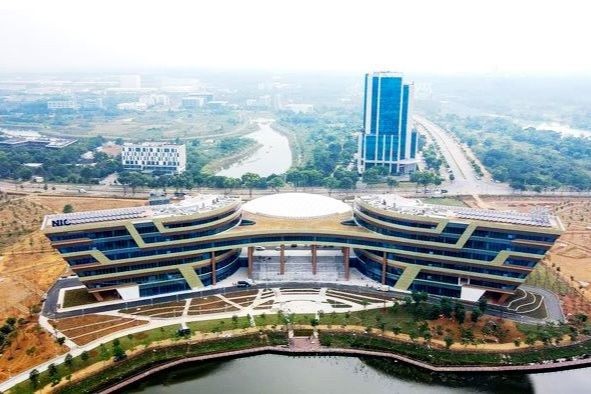Amended Capital Law supports high-tech development ambitions
VGP - The amended Capital Law will bring to promote investment in Ha Noi's hi-tech zones, said Former Vice Director of the Viet Nam Industry and Trade Information Center under the Ministry of Industry and Trade, Le Quoc Phuong.

A corner of Hoa Lac Hi-Tech Park
Prospects for high-tech zones
Over the past two decades, the establishment of high-tech zones has largely attracted domestic and foreign investors, effectively combining production with research, technology transfer, and high-tech workforce development.
However, their development has resulted in low occupancy rates primarily due to a weak legal foundation for management, an inability to keep pace with the rapid development of hi-tech zones, and time-consuming administrative hurdles.
Projects in hi-tech zones must meet stringent criteria in terms of technology, products, and regulations, which are subject to lengthy approval processes. There is also a lack of special incentives to attract highly skilled professionals to work in hi-tech zones.
Therefore, the amended Capital Law, which gives Ha Noi's People's Committee the power to establish, adjust, and expand hi-tech zone boundaries in the city, presents a very favorable condition and opens a new era for hi-tech zones in Ha Noi. It addresses the current difficulties and challenges faced by hi-tech zones.
The Former Vice Director highly appreciate the provisions in Article 24 of the Capital Law amendment. Granting Ha Noi autonomy in developing hi-tech zones allows the city to make decisions that best suit the capital city's development requirements.
The additional provisions provide even more opportunities and advantages for hi-tech zone development, particularly those on the allocation of city budget to support hi-tech zones, especially rental dormitories for workers. Additionally, more special incentives and support policies will greatly enhance the local investment attractiveness.
Clear privileges for Hoa Lac Hi-Tech Park
Hoa Lac Hi-Tech Park is a hub for research, development, testing, and application of high technology, as well as for training high-tech human resources, producing high-tech products, and fostering innovation, which is of key importance to the nation and the capital city.
Despite its extensive development over 27 years, including substantial investments and comprehensive transportation infrastructure, Hoa Lac Hi-Tech Park has not fully met expectations. It lacks major global technology giants like Intel, Apple, and NVIDIA, and faces challenges in electricity and telecommunications infrastructure.
The specific incentives for the Hoa Lac Hi-Tech Park in the amended Capital Law highlight its central role in synchronizing hi-tech zone developments across the city. This transition from Ministry of Science and Technology management to municipal oversight aims to accelerate robust scientific and technological growth for the capital and the nation. With greater autonomy, Hoa Lac Hi-Tech Park would proactively attract investments and drive economic development.
The empowerment of the governing board increases operational autonomy. However, challenges persist in implementing these functions due to the lack of specialized legal provisions and insufficient allocated resources.
Moreover, recognizing the Hoa Lac Hi-Tech Park management board as a direct administrative entity under the municipal government signifies a breakthrough, facilitating proactive management.
This includes authority over zoning and detailed construction planning within the industrial park and land allocation, leasing, and management, all of which are critical to facilitating comprehensive development projects integrating production, research, residential services, and operational support. However, adherence to approved zoning plans restricts investors' desires for tightly integrated complexes of research, manufacturing, and accommodation.
Ha Noi must strategically plan the Hoa Lac Hi-Tech Park as a key district, focusing on developing a smart, sustainable city with modern amenities to attract major investments from high-tech multinationals. Efforts are needed to regulate and enhance comprehensive infrastructure beyond basic utilities like transportation and telecommunications to ensure a livable environment with housing, schools, banks, shops, and recreational facilities.
Resources should be prioritized to upgrade infrastructure and landscaping and create optimal conditions for investors. Specific policies should aim at attracting Foreign Direct Investment (FDI) in high-tech sectors such as semiconductor manufacturing, electronic chip design, AI, biotechnology, and other high-tech services./.

